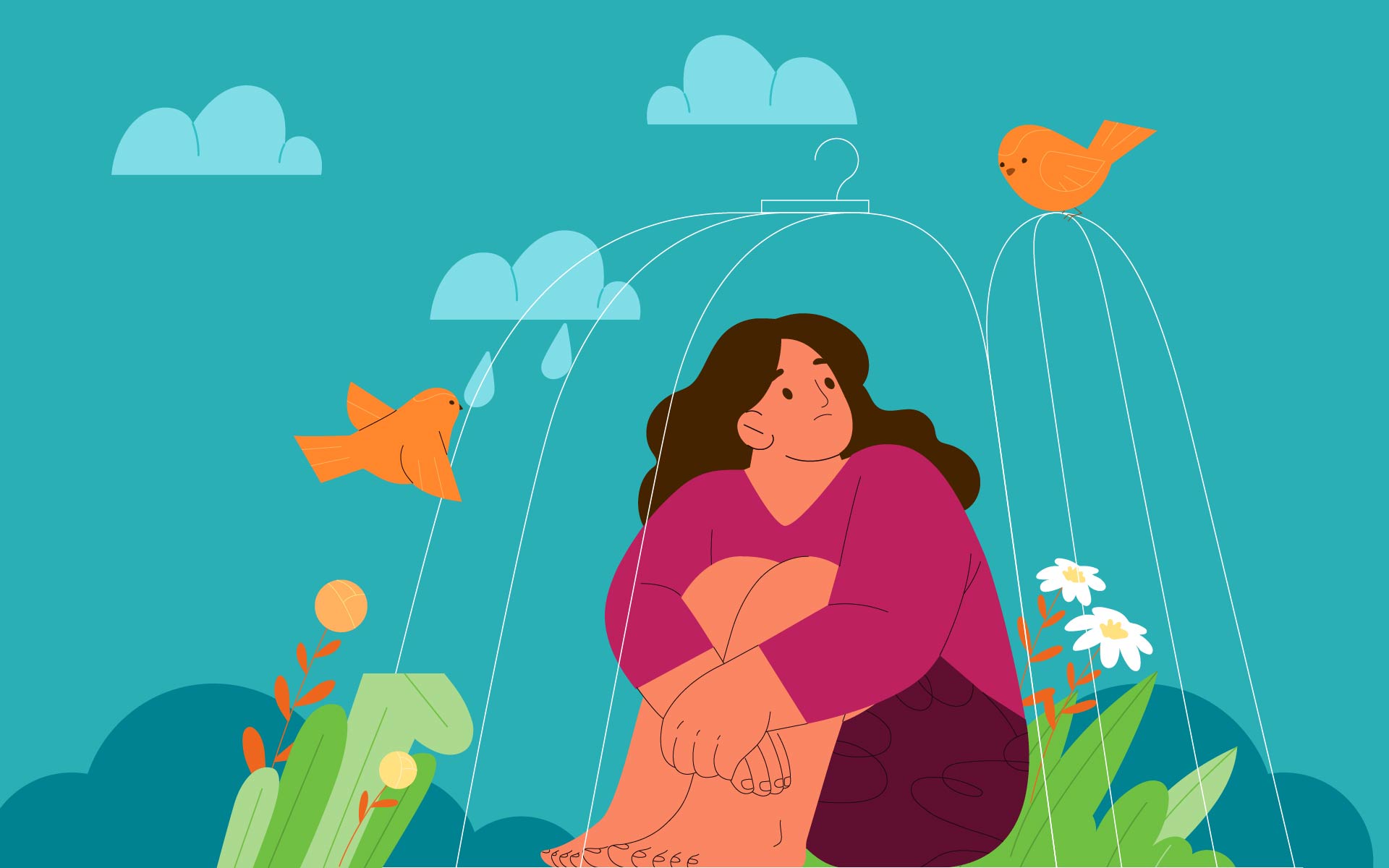Episode 2 of Point of View with Barry Boyce, Editor in Chief of Mindful Magazine, and Heather Hurlock, Senior Editor, Digital at Mindful.org, explores happiness. It’s a tricky word, happiness. And even though the Declaration of Independence guarantees us the right to pursue happiness, the word can still seem a bit trivial as a guiding principle.
HH: Barry, why is happiness a tricky word?
BB: I think one of the most important things is, for one thing, to unpack that word, and to look at all its different dimensions. It’s such a tricky word because it’s so fuzzy and multidimensional in its meaning. The moment you say I want to be happy, or even better if somebody asks you are you happy? If I ask you, right now, are you happy? You have to start thinking about it. And you wonder: geez, am I happy? And automatically you’re anxious. So there’s a little bit of trick or a trap in there.
If you think about it, if I ask you: Are you happy? What kind of thinking are you going to start to apply? You’re going to look at the past and the future: “What do I have coming up to look forward to? There’s that vacation we’re going to do this summer, so I’m happy about that. I’m really dreading this new job and whether we’re going to be able to pay the mortgage… And geez, have I had a good life? I think I’ve had a good life…” So now, where are you? You’re all caught up in your head and you’re trying to weigh and evaluate things from the outside in. That’s already a problem with the conventional term happy.
The beauty of mindfulness is that, in the practice of meditation, you get a break from the pursuit of anything…And, what tends to happen over time is that a sense of well-being creeps in on you.
To the extent that happiness is a word that refers to a passing mood, as compared to sadness, say, then that happiness is not something to pursue as a life pursuit, because it just sets you up for failure. What’s most interesting to me, I think, is where mindfulness fits into this whole picture. The beauty of mindfulness is that, in the practice of meditation, you get a break from the pursuit of anything, you can just be there. And when the question of “am I happy?” comes up, you can let it be there—you can just let it drop away and be present with yourself. And what tends to happen over time is that a sense of well-being creeps in on you, and, in spite of yourself, this sense of well-being overtakes you. And it has to do with less struggle and fighting and it’s more from the inside out than the outside in.
HH: You say “in spite of yourself” well-being overtakes you. Can you elaborate?
BB: Yes, the in spite of yourself part is, in spite of that nagging voice in your head. It’s a restlessness that’s there. And you know, it’s interesting, the happiness researchers—particularly Dacher Keltner at the Greater Good Science Center—like to talk about awe. Letting yourself be hit by the simplicity and directness of your experience.
Awe can overtake any of us at any moment. And for most of us, there’s some little thing at least once a day that does something. It could be the look on your child’s face or something funny that occurs. Meditation is more about increasing the frequency.
HH: That touches on the idea that mindfulness is an innate human experience and something that we can cultivate to help us be more present, aware, and able to observe our surroundings. It opens us up to awe.
BB: Very much so. It’s part of our human functioning. If you slow down the pursuit a bit, then there’s some basic quality that you have. You’re going to be more powerful in whatever you do if you do it from that kind of basis.
HH: That reminds me of the Barbara Graham piece we did about the science of happiness, she mentions cultivating gratitude as a path to happiness. And when you hear “cultivating gratitude” it can sound sort of insubstantial. But, when you look at the science of it, the scientists are saying that when you feel gratitude you flood your brain with these certain positive, beneficial neuro-chemicals. And on the other side of that, if you’re feeling resentment and regret you’re flooding your brain with a whole different set of chemicals. So the question becomes, which ones would you rather be flooding your brain with on a regular basis?
BB: What kind of pathways are you forging? What kind of trails are you blazing? In brain terms, they say: as it fires, so it wires. Meaning, if you continually fire synapses around chocolate cake, you begin to create a habit of seeking and obtaining chocolate cake. Building pathways that have to do with gratitude. It’s interesting, that more open approach allows you to savor the world, and that’s another phenomenon that the happiness people talk about along with awe and gratitude—There’s also the quality of savoring.
HH: And when we’re talking about being thankful for what you have and savoring, we’re not again talking about just things that you can acquire, accomplishments you can stack up, it’s more than that.
One of the best thankfulness and savoring practices is window shopping.
BB: It is more than that. And the issue with things is not so much the things, it’s the getting and the keeping. So, for example, one of the best thankfulness and savoring practices is window shopping. It’s actually possible to stand there and admire something and be taken by it and to not have to necessarily buy it. And also it’s like appreciating someone else’s clothing. It doesn’t have to be about having that clothing, you can just appreciate the color and the texture.
HH: I like this because you hear a lot about contentment in terms of what happiness is, and when you think of what is opposite of contentment, it’s envy. So appreciation and gratitude can play into balancing out that contentment/envy dichotomy.
BB: Yes, very much so. I think contentment is a quality that is also cultivated by meditation. That when you let go of a little bit of the struggle, a part of that quality that comes over you could be described as contentment. That things are okay as they are. Whatever they are. And it’s also, why there are happiness researchers is not only to look at personal happiness but also as a societal norm. That’s why I think this notion of gross national happiness that comes out of Bhutan is an interesting notion. We have the notion of gross national product—if the GNP goes up because we built prisons or because more teenagers are smoking tobacco, is that a gross national good thing? We think of it as such. Gross national happiness probably ought to be gross national well being or something like that, that looks at the overall communal well-being of the world we share. It speaks to values that go beyond simply getting and fighting over our different views of what happiness means.
HH: It takes it out of the superficial realm of acquiring wealth or things and moves happiness into a space of wellness, mental wellness, and physical wellness—well-being.
BB: True, it also makes us think about how our wellness and well-being is a communal thing. We’re interconnected, so to the extent that there’s well-being in your community, there’s more well-being for you.
It’s important to recognize that mindfulness and awareness, kindness and caring, are qualities that come over us in spite of ourselves and they pre-exist—they’re not created by some kind of practice.
HH: I wonder if you could talk about how people can then practice cultivating happiness and well-being, what’s your opinion is of the best way to do that?
BB: I think in general it’s good for people to have something in their life that allows them to take a space where some of their inherent mindfulness and caring can shine through. And that could be gardening or swimming or walking, or it could be all variety of things. There’s no question that a little bit of meditation practice helps in my view. And a lot of meditation can help, too. But, it’s just important to recognize that mindfulness and awareness, kindness and caring, are qualities that come over us in spite of ourselves and they pre-exist—they’re not created by some kind of practice.
I wanted to add one thing: Part of our lives involves facing very difficult challenges that can go on for a long time period. And if you just try to fly under the banner of happiness, people who are going through great struggles, say, for example, they’ve been in a terrible car accident, and their whole life has been turned upside down, and they’re suffering from chronic pain, and maybe they have an unsupportive spouse who’s now left them… You can think of all sorts of scenarios, in others lives and in one’s own life, where we go through very, very challenging periods. And a happiness ethic is alienating when you’re going through that.
So, what are we really looking to? I love the notion of equanimity and resilience that’s part of our innate strength and part of our innate mindfulness and awareness. Equanimity meaning, winter spring summer fall, we have the same kind of quality. And resilience is that we can be pushed very far, to the limits of our capabilities, but somewhere in there we have some bounce back. And that’s part of our well-being. And it doesn’t sound like something like happiness. Happiness sounds trivial when you’re talking about somebody having deep resilience and recovering from having been in a war, for example. But, clearly, that’s something great about being human, that we have that kind of depth of strength and well-being.
HH: I am continually trying to figure out how to introduce mindfulness to a close relative who struggles with PTSD, and he’s hung up on the notion of weakness, and it being a sign of weakness to even entertain some of these ideas that we’ve been talking about. But when you talk about resilience and strength, that feels like an entryway that might resonate.
BB: Yes, in fact, that’s very poignant because what we’re really talking about here are indefinable, indescribable qualities. So, the name you give it for one person isn’t going to work very well for another one. So, if you’re talking about somebody in the midst of PTSD, talking about being happy isn’t going to go very far. Because, why would you trust that? But finding strength, maybe? It’s not one size fits all.







